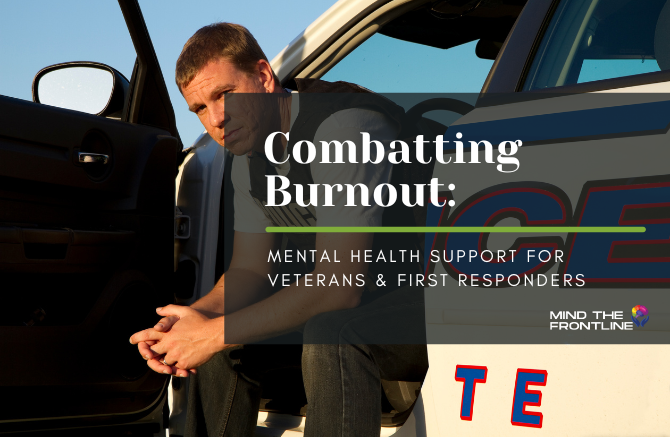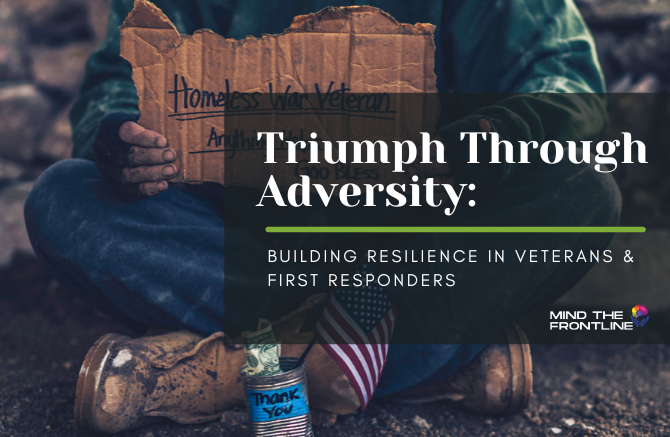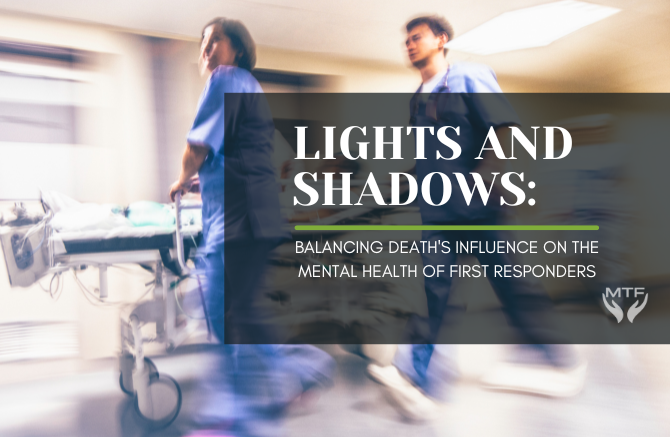Triumph Through Adversity: Building Resilience in Veterans & First Responders
Explore the importance of resilience in veterans & first responders and how they can overcome adversity.
3 min read
 Chris Smetana, AS, FP-C, CCP-C, NRP | Founder/President
:
Apr 23, 2024
Chris Smetana, AS, FP-C, CCP-C, NRP | Founder/President
:
Apr 23, 2024

Discover effective strategies for veterans & first responders to combat burnout and prioritize mental health support
Recognizing the signs of burnout is crucial for veterans and first responders to prevent the negative impact it can have on their mental health and overall well-being. Some common signs of burnout include feeling exhausted and depleted, experiencing a lack of motivation or interest in work, and feeling increasingly cynical or detached from others. It is important to pay attention to these signs and take proactive steps to address them.
Another important sign of burnout is experiencing physical symptoms such as headaches, stomachaches, or changes in appetite or sleep patterns. Additionally, individuals may find themselves becoming more irritable or having difficulty concentrating. Recognizing these signs early on can help veterans and first responders take necessary measures to prevent burnout from worsening.
By being aware of the signs of burnout, individuals can better understand when they need to prioritize their mental health and seek support.
-1.png?width=301&height=196&name=Blog%20Pictures%20(1)-1.png)
Mental health support is crucial for veterans and first responders to effectively combat burnout and maintain their well-being. These individuals often face high levels of stress, trauma, and exposure to critical incidents in their line of work, which can significantly impact their mental health. Having access to appropriate mental health support can help them navigate the challenges they face and build resilience.
Support can come in various forms, such as counseling services, peer support groups, and mental health awareness programs. It is essential for organizations to prioritize mental health support and create a culture that encourages seeking help when needed. By providing resources and fostering an environment that values mental well-being, veterans and first responders can feel more supported in their journey to combat burnout.
-1.png?width=301&height=196&name=Blog%20Pictures%20(2)-1.png)
Developing effective coping mechanisms is essential for veterans and first responders to manage stress and prevent burnout. Some strategies that can be helpful include:
- Engaging in regular physical exercise, which can help reduce stress levels and promote overall well-being.
- Practicing relaxation techniques, such as deep breathing exercises or meditation, to help manage stress and promote relaxation.
- Establishing healthy boundaries and prioritizing self-care. This can involve setting limits on work hours, taking breaks when needed, and engaging in activities that bring joy and relaxation.
- Building a strong support system of friends, family, and colleagues who can provide emotional support and understanding.
By incorporating these coping mechanisms into their daily lives, veterans and first responders can better manage the challenges they face and reduce the risk of burnout.
.png?width=301&height=196&name=Blog%20Pictures%20(5).png)
Seeking professional help is an important step for veterans and first responders who are experiencing burnout or struggling with their mental health. Mental health professionals, such as therapists or counselors, can provide specialized support and guidance tailored to the unique needs of these individuals.
Professional help can offer a safe and confidential space for veterans and first responders to process their experiences, learn coping strategies, and develop resilience. It is important to remember that seeking help is a sign of strength and can significantly contribute to one's overall well-being.
If you or someone you know is a veteran or first responder experiencing burnout or mental health challenges, it is important to reach out to a mental health professional or a helpline for support.
-1.png?width=301&height=196&name=Blog%20Pictures%20(3)-1.png)
Creating a supportive work environment is crucial for preventing burnout among veterans and first responders. Organizations can take several steps to foster a culture of support and prioritize mental health:
- Provide training and education on mental health awareness and self-care strategies. This can help increase awareness and reduce stigma around seeking help.
- Establish policies that promote work-life balance, such as flexible scheduling and adequate time off.
- Encourage open communication and create channels for employees to express their concerns or seek support.
- Offer employee assistance programs (EAPs) that provide access to counseling services and other resources.
By implementing these measures, organizations can create a supportive work environment that values the mental well-being of veterans and first responders, ultimately reducing the risk of burnout.
.png?width=301&height=196&name=Blog%20Pictures%20(4).png)
Explore many valuable First Responder Mental Health and Wellness resources on Mind the Frontline's online platform. Discover the link below to access a wide range of support and information tailored specifically for first responders.
Additional Mind the Frontline Resource's
Stay connected with Mind the Frontline on Facebook & LinkedIn.
$50 off code:frontline40
Invest in your mental health with the Mind Shield Health and Wellness Membership—a transformative resource tailored for first responders. For less than $4 per month, this 100% tax-deductible membership offers a suite of exclusive benefits designed to enhance your overall well-being.
Membership Highlights:
The Largest Online First Responder Mental Health and Wellness Resource Directory: Immediate access to a comprehensive database catering to the unique needs of first responders.
State-by-State Mental Health, Wellness, and Recovery Resources: Navigate a localized guide for personalized support.
MindShield 24/7 Debrief Hotline: Confidential and secure debriefing space, available whenever you need it.
Virtual 1-1 Peer Support: Connect with a supportive network of peers through our virtual platform.
Mind the Frontline's Preferred Mental Health Providers List: Access trusted mental health professionals aligned with our mission.
Discounts to Mental Health Apps: Exclusive discounts on leading mental health apps like Headspace and more.
Recommended Books, Podcasts, and Resources: Curated selection to enhance your mental health journey.
Weekly Blog Articles/Podcasts: Stay informed and inspired with regular content delving into crucial insights and topics.
Interactive Workshops and Webinars: Engage in dynamic sessions promoting mental health, career development, and overall well-being.
Mindfulness and Meditation Resources: Tools for incorporating mindfulness into your daily routine.

Explore the importance of resilience in veterans & first responders and how they can overcome adversity.

1 min read
In Greek Mythology, the River Styx separates the land of the living from the underworld, souls that have departed require safe passage across this...

A First Responder's Guide to Mental Health Recovery First responders dedicate their lives to serving others, often at the cost of their mental and...